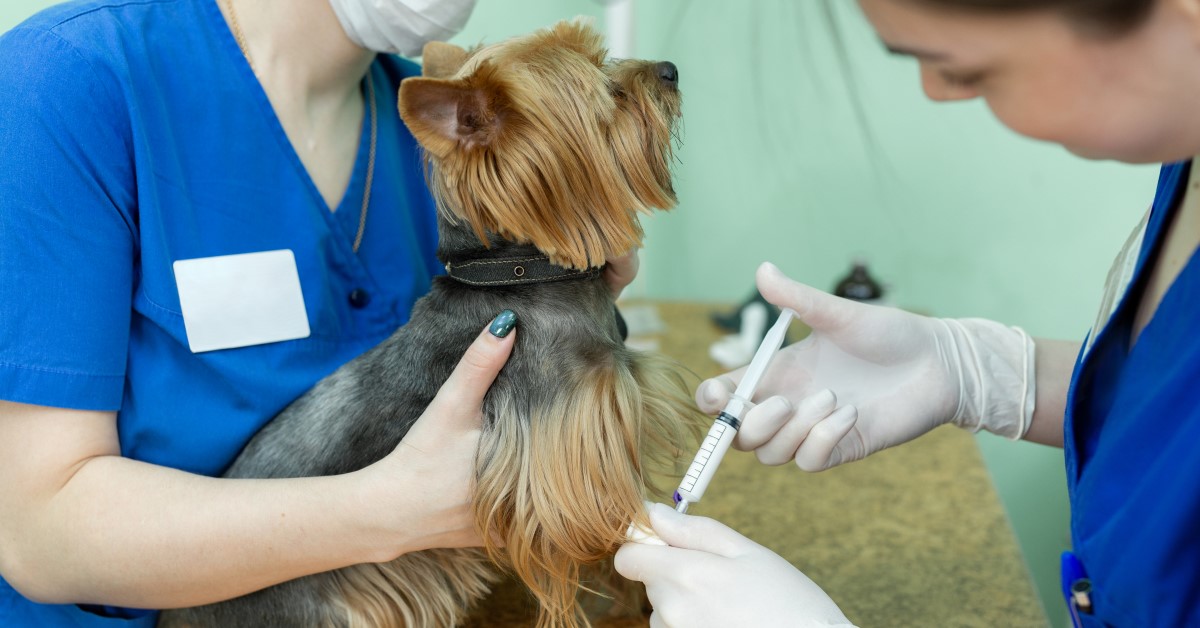Dog Vaccination Schedule
Pet vaccinations guard against preventable and costly diseases like rabies and distemper.

Vaccines are a preventative action that pet owners can take to keep their pets safe from highly contagious diseases, such as canine distemper, respiratory tract infections, and parvovirus. Dog vaccinations can also guard against transmissible diseases that pose a risk to humans, such as rabies.
Vaccinating your pet can give their immune system a boost and help them live an overall healthier life. When purchasing or adopting a puppy, request a copy of the animal’s medical records, including a list of their immunizations. The following outline shows what vaccinations are recommended at each stage in your dog’s life.
6 to 8 Weeks Old
Between six and eight weeks of age, your puppy should undergo their first physical exam. At this visit, the vet will evaluate your dog’s general health, lung and heart status, teeth and gums, and temperature. The vet may also recommend a fecal analysis to check for parasites, as well as prescribe deworming medication. The following vaccines are recommended at 6 to 8 weeks of age:
- DA2PP (distemper, adenovirus 2 [hepatitis], parainfluenza, and parvovirus)
- Optional: Bordetella (required every 6-to-12 months depending on your pet’s risk of exposure to Bordetella)
10 to 12 Weeks Old
At 10 to 12 weeks old, your vet will undergo a second full physical exam to look at your pet’s general health, lung and heart development, and other body structures. A second deworming may be necessary for some puppies, as well as a second fecal analysis to look for parasites if any were discovered at the previous visit. Your 10-to-12 week old puppy will require the following vaccines:
- 2nd DA2PP (distemper, adenovirus 2 [hepatitis], parainfluenza, and parvovirus)
- Optional: Bordetella, Influenza, Leptospirosis, and Lyme disease
14 to 16 Weeks Old
When your pet becomes 14 to 16 weeks old, your vet will perform a third full physical exam to continue evaluating your puppy’s growth. If required, an additional deworming and fecal analysis may be recommended. Dogs should have the following vaccinations at this age:
- 3rd DA2PP (distemper, adenovirus 2 [hepatitis], parainfluenza, and parvovirus)
- Rabies vaccination
- Optional: Bordetella, Influenza, Leptospirosis, and Lyme disease
5 to 6 Months Old
Around 5 to 6 months of age, pet owners should start thinking about spaying or neutering their dogs. According to the AAHA Canine Life Stage Guidelines, small-breed dogs with a projected adult bodyweight of under 45 pounds should be neutered at six months of age or spayed before the first heat (five to six months of age). Large breed dogs should wait to be spayed or neutered after they stop growing, usually between 9 and 15 months of age. At five to six months old, pet owners should also consider:
- Deworming
- Microchipping
Annual Adult Visits
After the first year, your dog should visit the vet for an annual checkup. Every one to two years, adult dogs should have DHPP (distemper, adenovirus, parainfluenza, and parvovirus) vaccines. Rabies vaccinations are recommended every one to three years. Optional vaccinations as an adult include influenza, coronavirus, Bordetella, leptospirosis, and Lyme disease.
Important Dog Vaccinations
It is important to know what vaccinations your dog receives and what these vaccines do. Here is a closer look at important vaccinations that your vet may recommend:
Canine Distemper
Distemper is a serious and highly contagious disease caused by a virus that attacks the animal’s gastrointestinal (GI) and nervous systems. It is generally spread through airborne exposure from an infected animal but can also be transmitted through shared water and food bowls. It causes nose and eyes discharge, coughing, vomiting, diarrhea, seizures, paralysis, and even death. As there is no cure for canine distemper, prevention via vaccinations is essential.
Canine Hepatitis
Hepatitis is an infectious disease that affects the kidneys, liver, lungs, spleen, and eyes of an infected dog. This highly contagious viral infection can cause an array of symptoms, such as fever and congestion of the mucus membranes. Without treatment, dogs can experience vomiting, jaundice, pain around the liver, and stomach enlargement. There is currently no cure for canine hepatitis but vaccinations can help prevent it from developing.
Parvovirus
Parvovirus, also known as Parvo, is a contagious virus that can affect dogs of any age but is most common in puppies less than four months of age. This virus attacks the GI system, resulting in a loss of appetite, fever, vomiting, and bloody diarrhea. If extreme dehydration occurs, it can kill a dog in as little as 48 to 72 hours. There is no cure for parvovirus but vets can help keep the dog hydrated and control symptoms until the animal’s immune system beats the illness. Vaccinations can help prevent Parvo.
Rabies
Rabies is a type of viral disease that affects mammals by invading their central nervous system, resulting in excessive drooling, headache, hallucinations, anxiety, paralysis, and death. This disease is most commonly transmitted through the bite of a rabid animal. Treatment for rabies is required within hours of the infection otherwise, the animal is likely to die. Rabies vaccinations are required in most states.
Bordetella Bronchiseptica
Bordetella is an infectious bacterium that can cause severe fits of coughing and whooping in dogs. In rare cases, it can cause seizures and death. Bordetella is the main cause of kennel cough and can be prevented by vaccines available in injectable or nasal spray forms. This vaccination is recommended if you plan on boarding your puppy, using doggy daycare services, or attending group training classes.
Getting Your Dog Vaccinated
Pet vaccinations are extremely important to prevent pet diseases and avoid costly treatment for preventable illnesses. Vaccinations remain the most effective method for keeping your pet safe and healthy.
Ready to start saving money on pet wellness care?
Then take a look at Mint Wellness, the pet wellness plan that provides fast reimbursement on routine pet care. Save on vaccinations, wellness exams, preventatives, dental, and more!
Learn More


